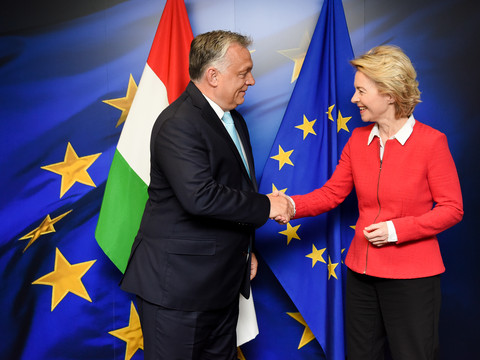[ad_1]

On Friday evening (23 April) there will be a fraught meeting at the EU Commission’s Berlaymont headquarters, as commission president Ursula von der Leyen will welcome Hungarian prime minister Viktor Orbán.
The key topic, as it has been for some time between the EU and Hungary, is money and how to oversee it.
On the agenda will be Hungary’s national plan for using the money available under the EU recovery fund – which von der Leyen is also discussing with other leaders on their own domestic plans.
Orbán, who asked for the meeting, nevertheless said on Friday he would discuss the “future of Europe” with the executive chief, not the fund.
Orbán (and his Polish counterpart) last December threatened to block the entire EU recovery fund – along with the EU’s long-term budget – if fellow leaders did not water down efforts to tie those funds to respect for the rule of law.
Hungary and the EU have been locked in legal and political battles for several years.
Now, neither side want to the situation to escalate. Orbán is keen to ensure that the over €7bn in grants is unleashed – as he gears up for a general election next spring.
Orbán arrived in Brussels with some gestures of cooperation, after his government tabled amendments earlier in the week on two pieces of legislation that were previously deemed illegal by the European Court of Justice.
One is on scrapping provisions on foreign donations given to civil society organisations that the court said were “discriminatory and unjustified restrictions”.
The other is on the higher education legislation, which eventually forced the George Soros-founded Central European University to relocate to Vienna from Budapest.
Hungary’s national plan, as with all EU countries’ plans (which have to be submitted by the end of April), will be assessed by the commission over the next two months.
The commission will then make a proposal to the council of member states to approve the plans, where governments can further scrutinise them and demand tweaks.
These plans have to adhere to common goals agreed by EU leaders last year, such as that 37 percent of expenditure should be made on climate-relevant investments.
However, Hungarian opposition MEP István Ujhelyi (Socialists and Democrats) in a letter to von der Leyen on Thursday warned that “neither the 37 percent climate nor the 20 percent digital objective” is adequately supported in the Hungarian national plan.
Ujhelyi argued that the majority of the reforms and investment proposed by Orbán do not take into account core elements of the European Green Deal, the bloc’s flagship climate project.
Orban’s critics have also pointed out that the Hungarian PM wants to spend a good chunk of the recovery money on higher education. In recent years much of the governance of public universities have been turned to foundations with ministers or other government-allies in boards – raising concerns over academic freedom.
Corruption concerns
The recovery plans should also respect the so-called country-specific recommendations, annual advice from the commission on how to transform the economy and administration of member states.
Here, the EU last year highlighted the “lack of competition in public procurement” as an “important concern”, particularly the high number of single bids, identified “systemic deficiencies” and weaknesses in the public-procurement control system.
It also pointed out that corruption, access to public information, and media freedom “caused concerns”, adding “determined systematic action to prosecute high-level corruption is lacking”, while “investigation and prosecution appears less effective in Hungary than in other member states”.
Hungary has headed the EU’s anti-fraud agency’s list of countries where irregularities have been found in spending EU funds between 2015 and 2019, although the Orbán government – in power since 2010 – has argued that has to do with misuse by a previous government.
“Rule of law, corruption, and public tenders are very relevant of implementation of recovery fund. […] This is very central to the reforms that we are discussing with member states and requiring to be included in the plans for those member states who had recommendations in that respect,” said an EU official on Friday, ahead of the meeting.
Orbán has one key card in his hands: Hungary has still not approved the legislation necessary for the commission to raise money on the markets – the basis for the recovery’s financing.
However, it will be difficult to hold out on this. On Friday, Germany also ratified the legislation, after its constitutional court gave the go-ahead.
“Tomorrow is not a meeting at which anything will be decided, it will be a discussion,” said commission spokesman Eric Mamer on the von der Leyen-Orbán head-to-head meeting on Thursday.
[ad_2]
Source link